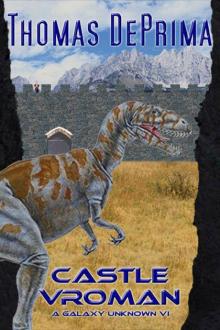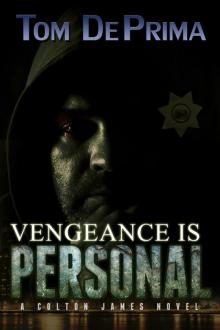- Home
- Thomas DePrima
When the Spirit Calls (When the Spirit... series - Book 2) Page 12
When the Spirit Calls (When the Spirit... series - Book 2) Read online
Page 12
"What happened to the two elders?" Renee asked.
"The text doesn't say."
"So they might both have died?" Megan asked.
By way of an answer, Erin simply shrugged her shoulders, grimaced, and shook her head.
"Madam Elana," Arlene said, "you mentioned a book by a twelfth-century Italian scholar which tells of a much earlier release of a demon. Could it be a transcription of the same account as this incident?"
"It's possible. The scholar who compiled the information most likely got it from a written account."
"If this transcription came from the same parchment scroll," Arlene said, "it would save us a trip to the Prague Museum because that other book couldn't contain more information than this one."
"We should probably check out the Prague book just to be sure," Renee said. "I believe the expression is, 'Leave no stone unturned.'"
"You're right," Arlene said. "We may only get one shot at this. The stakes are too high to ignore possibly critical information. And we should begin that effort sooner than later. It may take time to get permission to see the book."
"I might be able to help there," Madam Elana said. "My reputation as a dealer in rare books could be invaluable in persuading the museum curator to let us examine their copy. If not, then perhaps the loan of one of my oldest manuscripts, one which we've determined contains no relevant information about demon banishment, might be bartered for access."
* * *
Renee and Madam Elana boarded a commuter plane at the nearby county airport a few days later. It would take them to the Albany Airport, where they would take a connecting flight to Kennedy Airport. From there, they would fly direct to London, changing planes once more for a flight to Prague. There was a direct flight from Kennedy to Prague, but the best flight itinerary for a direct flight would have them sitting in either Albany or Kennedy for six hours or more. The layover at Heathrow was only two hours.
Included in Madam Elana's carry-on luggage was a handcrafted wooden box containing a tenth-century religious tome conservatively valued at a hundred thousand dollars. It was her most valuable rare book. The curator at the National Museum had again refused access to the museum's ancient books and manuscripts, citing fragility issues, but upon learning that Madam Elana's extensive personal collection included the extremely rare manuscript and that a two-year loan to the museum would be possible providing Renee and Elana were given access to the Museum's complete library, he jumped at the offer. They would receive the same special access privileges his country's top research scholars enjoyed.
Megan, Arlene, and Erin planned to continue reading the collected works as before. Not a page would be neglected nor a word skipped. They had a chant now, but not necessarily the chant that would send the demon Kamet back to the Underworld. If there was another recorded incident regarding the banishment of demons to be found anywhere in the vast library Madam Elana had assembled, the three women intended to uncover it.
* * *
"Madam Arlene?" the woman said, both as a question and a statement to get Arlene's attention as she left the house she was renting.
Arlene had returned to the house to get the notebook she had forgotten to bring with her that morning, so she was alone. Megan and Erin had remained at the shop to continue working.
"Yes?"
"Good morning. I'm Meredith Blakely. Do you have a few minutes?"
"A few minutes for what?"
"Oh, excuse me. I work for the Lake Georgina Telegraph. My editor would like me to do a story on you."
"Thank you, but I don't do interviews." Arlene smiled and tried to get past the woman, who purposely moved to block her path.
"But it would just take a few minutes, and it could help sell your book."
"I don't do interviews," Arlene said again with exasperation when the woman again blocked her path to her car.
"I promise— it will only take a few minutes of your time."
Arlene sighed and said, "Alright. What is it?"
The woman whipped out a small recording device and activated it. "Interview with Miss Arlene Watson aka Madam Arlene. Miss Watson, it's public record that you were the one who reported the location of the body from an eleven-year-old homicide case, yet it's alleged that you've never been to Lake Georgina before. How do you explain that?"
"I'm sure the answer to that is also in the public record."
"Uh, yes, but our readers would like to hear it from you."
"I'm sure the public record states it in much more detail than I have time for right now. Is there anything else?"
"It's rumored around town that you've been seen talking to a ghost at Gianni's Restaurant. Can you confirm that?"
"I've exchanged pleasantries with Papa Gianni on several occasions."
"But he died several years ago."
"Perhaps that's why he's a spirit now."
"So you're saying the restaurant is haunted."
"Not as you mean it."
"How else can it be stated? Either it's haunted or it isn't."
"Papa doesn't annoy anyone or even make his presence known to anyone. The term haunted usually implies that a spirit is actively annoying the living."
"Then how can you know his ghost is there?"
"I'm a spiritualist. I can see the spirits that haven't crossed over to the immortal plane."
"Are there many?"
"No, not very many."
"And you talk to them also. Isn't that right?"
"Yes."
"What do you usually talk about?"
"Whatever comes to mind."
"Such as why they're still hanging around?"
"Yes, that's common."
"And what do they usually say?"
"Most are here because of promises they made while they were alive or to look after loved ones. Some are seeking justice against the person or persons responsible for their death or someone who wronged them while they were alive."
"Such as Simona?"
"She hasn't revealed her reasons to me."
"But that would be a logical one?"
"I would say that's a logical assumption."
"Has Simona spoken to you?"
"That's a matter of public record."
"Has Papa Gianni spoken to you?"
"Yes."
"Why is he still here?"
"When he was alive, he made a promise to always look after his young daughter. He's keeping that promise."
"But he's a ghost. What can he do?"
"As a spirit, he can see and hear things without alerting most people to his presence. He can then seek help from someone like myself."
"But he can't do anything directly."
"His options are limited because he no longer has a corporeal body."
"So what can he do to right a wrong?"
"He could contact a spiritualist and hope that he or she will be able to help by revealing the facts to people who can right the wrong."
"I see. Tell me, Miss Watson. Have you ever sought professional help for this problem?"
"What problem?"
"This delusion that you can speak to the dead?"
Arlene breathed deeply and released it before saying, "This interview is over Miss Blackly."
"It's Blakely."
"I think Blackly is more appropriate. Good day."
As Arlene tried to step around the woman, Blakely again moved to block her. Rather than politely submitting again, Arlene extended her arm and tried to prevent her from again blocking Arlene's access to her car. Blakely's right heel caught on the higher surface of grass bordering the sidewalk and she fell to the lawn. Arlene looked down to confirm that Blakely hadn't been injured, then proceeded to her car without apologizing. A neighbor across the street turned back around quickly as Arlene looked in her direction.
* * *
Several hours later, as Arlene, Megan, and Erin were discussing what to order for lunch, Lieutenant Bolger arrived at Georgina Antiques and was guided to the basement library by
Oculara. Arriving inside the library, he stopped for a few moments with his mouth agape as he looked around at the numerous books that filled the shelving. Then he followed Oculara to the reading room where the four women were sitting.
"Lieutenant," Arlene said. "Welcome to the reading room. What brings you here?"
Glancing around before saying anything, Bolger returned his attention to Arlene, and in his official police manner, he said, "Miss Arlene Watson, it's my duty to place you under arrest for the murder of Meredith Blakely. You have the right to remain silent, and you have the right to have an attorney present at your questioning. If you cannot afford one, an attorney will be appointed by the courts. Anything you say can be taken down and used in evidence against you. Do you wish to make a statement at this time?"
Arlene was speechless and she stared at Bolger with her jaw hanging partly open before she collected her wits and shut her mouth. Finally, she said, "Are you serious?"
"I'm afraid so. The county sheriff has ordered me to bring you in."
"Richard," Erin said, "That is an absurd accusation."
"Perhaps, but I have my orders, Erin."
"When did this alleged murder occur? Because Madam Arlene has been here all morning."
"Approximately three hours ago. We won't have a more precise time of death until the coroner establishes it. And we have a witness who places Miss Watson at the scene of the crime. So she obviously wasn't here all morning."
"I only went to our rented house to get a notebook I forgot to bring with me," Arlene said. "I went there and came directly back here."
"The body was discovered in the kitchen of your rented house. A neighbor saw you and Blakely together outside the house. So you had the means and the opportunity. All we need to determine is the motive."
Standing up, Arlene said, "Richard, I think you know I didn't injure Miss Blakely. Yes, I saw her at the house. She wanted to interview me. I made a few statements and then ended the interview. At that point I went to my car and returned here."
"The witness said you assaulted her."
"It was the other way around. She kept blocking my path to my car. After several efforts to walk around her, I finally put out my arm and stopped her from blocking my path. In her effort to get around me again, she tripped and fell on the grass area between the sidewalk and the curb. I visually assured myself she was not injured, and then went to my car and came here. Are you saying she was fatally injured in her fall?"
"No. She was stabbed to death in your kitchen."
"Stabbed? With a knife?"
"Yes. There were several punctures and the knife was still sticking out of her chest when we arrived to investigate the call."
"Why did you go to investigate? Who notified you?"
"Your landlady went there to replace the microwave oven you had reported wasn't working. She found the body and called the sheriff's office."
"Betty Cuzen found the body?" Megan asked. "Oh how horrible for poor Betty."
"Yes."
"Then she could have done it," Erin said.
"Extremely unlikely. A neighbor saw her struggling to carry the replacement microware to the house from her car and hurried over to help her. When no one responded to Betty's knock, she used her passkey to open the door. When they reached the kitchen and saw the body, they dropped the microwave oven, and Betty immediately called us. When I arrived, we found blood clotting on Blakely's body around the knife and pooling on the floor around the body. There were blood splatters everywhere, out to a distance of about eight feet, but none on Betty's or the neighbor's clothes."
"Do you see any splatters on my clothes?" Arlene asked.
"No, but you could have changed your clothes."
"It's easy to prove that's not the case," Erin said. "The store's security system will show Arlene arriving early this morning with Megan and myself, so you'll be able to see she was wearing the same clothes she has on now. The system's date and time stamp will show you the exact time she left to return to the house and the time she returned here, plus you'll also see she hasn't changed clothes."
"She could have changed into identical clothes."
"Richard, look at that suit she's wearing. I'd conservatively put its value at about a thousand dollars, and the blouse is very distinctive. People spending that kind of money for clothing don't purchase multiple items of the same clothing, even if they're available. They purchase different outfits."
"Look, I don't really think Madam Arlene murdered Meredith Blakely or had anything to do with the crime, but the sheriff has ordered me to arrest her. If I don't, he can fire me. I have no choice if I want to keep my job."
"I understand, Richard," Arlene said as she walked to where Bolger was standing. "I'm innocent and I'm sure I'll be exonerated when the facts are all known. I'm ready to go with you."
"Thank you, Madam Arlene." As he pulled handcuffs from the leather pouch on his belt, he said, "Please turn around and put your hands behind your back."
"Richard!" Erin said loudly. "I hardly think that's necessary."
"Orders, Erin. The sheriff ordered me to bring her in with her hands cuffed behind her back."
"And I suppose he's alerted the media to be on hand when you march me into the station."
"Uh, probably."
"I'm perfectly willing to go with you to have my account of the events officially recorded," Arlene said. "But— it sounds like the sheriff is trying to make a spectacle of my arrest and cause me great embarrassment for some reason. If you insist on embarrassing me like this, my one phone call will be to the offices of my principal attorneys. By this time tomorrow, there will be so many members of the legal profession in this town that you'll think there's a convention nearby. Richard, I'm not your average twenty-one year old. I know the score. And I promise that if you embarrass me like this I will sue the sheriff, the town, and the county for five hundred million dollars for deliberate defamation of character. And I believe I will win. But even if I don't win, it will cost the town and county so much to defend themselves in court over the next few years that both will have to claim bankruptcy, and the people of this county will run the sheriff and local politicians out on a rail because of their complete lack of good judgment."
"I've already warned the sheriff of that possibility."
"And he said?"
"He said he understands."
"That's all?"
"That's all."
"Okay, Richard. You've been warned in advance, so at least you know why the following events are occurring and understand that they are a direct result of your action here today." Arlene turned around and put her hands behind her back, ready to be handcuffed.
* * *
Chapter Eight
After several seconds of standing there like that, Arlene turned slightly and looked over her shoulder. "Well?"
"Aw, hell. Let the sheriff fire me. I won't act like a complete jackass and embarrass you like that in front of the press, and I won't be responsible for the county and town being sued. Let's just go to the jail." Bolger put the handcuffs back into the leather pouch on his belt.
"A wise decision," Erin said. "I hope you become the next sheriff when that old reprobate retires or is forcibly retired."
"Hell, I don't want that damn job. I would make a lousy politician. I have trouble following ridiculous orders from party higher-ups like the party chairman, who is only thinking about himself, his career, and his bank account. That's not why I became a cop. Let's go look at the security discs first so I can corroborate your alibi to the sheriff."
* * *
Prague's picturesque architecture survived World War II because the city wasn't targeted in the Allied bombing campaigns of Europe. With the collapse of the Soviet Union in the late 20th century and the Czech Republic's rebirth as a parliamentary democracy with close ties to the West, the lovely city became one of the hottest tourist destinations on the continent. The National Museum was located on one side of Wenceslas Square, so named for the 10th
century nobleman celebrated in the Christmas carol 'Good King Wenceslas.'
Madam Elana and Renee, after identifying themselves to a security guard at the desk inside the entrance of the National Museum, were directed to a museum docent and then escorted to a private conference room. An assistant curator arrived a few minutes later and introduced himself as Eduard Dvorak. Around sixty years old, Dvorak had the look of someone who enjoyed fine food in abundance. He was well dressed, and his salt-and-pepper hair was still full, but at just five-foot, five-inches, his belt would no doubt stretch to three-quarters of his height. He didn't introduce either of the two lab-coated people— a man and a woman— who'd accompanied him into the room.
"Is that the manuscript?" Mr. Dvorak asked as he pointed to the wooden box that sat on the conference table in front of Madam Elana when the limited introductions had been completed.
"It is," Madam Elana said.
"May I?" Mr. Dvorak asked as he slipped on a new pair of the white cotton gloves worn by experts everywhere so the natural oils in human hands didn't contaminate invaluable documents or objects.
"Please," Madam Elana said, gesturing towards the box in an invitation to examine the contents. "I have letters of provenance to verify authentication, but I'm sure you'll wish to ascertain its validity for yourself."
Mr. Dvorak pulled the box towards him and released the clasp that held the cover closed. He breathed in deeply as he raised the cover and saw the manuscript. "Dr. Janacek?" he said as he turned to the two people who'd accompanied him into the room.
As a slight, fiftyish woman with light brown hair and pallid complexion stepped to the table, Dvorak slid the box towards her. Having already slipped on a pair of new cotton gloves, she lifted the two pieces of wide red ribbon that lay atop the manuscript, revealing that an end of each extended down the inside of the box where it connected to a wooden shelf just slightly smaller than the interior area of the case. Pulling on the ribbon ends gently but firmly, the manuscript was raised from its protective case without risk of damage and laid on the table.
Ever so carefully, the woman began her expert assessment of the document. Certainly not the thorough examination that would be required to certify authentication for insurance purposes, her scrutiny was sufficient to ascertain that this was not some feeble attempt to pass a fraudulent document off as the real thing. The doctor was only trying to determine that if the document was indeed phony, it was a masterful phony. Later examination in her lab would allow her to certify the manuscript as genuine without damaging it. Such tests as Carbon-14 dating and spectrographic analysis were never performed on objects loaned to the museum unless required by insurance carriers, and then only with the owner's prior consent. There were other methods available that didn't damage the examined item and were almost foolproof. The documents in Madam Elana's possession clearly established a provenance of the manuscript, as well as the previous tests that had been performed for authentication. Satisfied from her cursory examination that the manuscript appeared to be genuine thus far, Dr. Janacek looked at Mr. Dvorak and nodded, whereupon he waved his hand lightly in a gesture of dismissal.

 Milor!
Milor! New Title 1
New Title 1 Return to Dakistee (A Galaxy Unknown, Book 8)
Return to Dakistee (A Galaxy Unknown, Book 8) The Invasion Begins
The Invasion Begins When the Spirit Calls (When the Spirit... series - Book 2)
When the Spirit Calls (When the Spirit... series - Book 2) Changing of the Guard (A Galaxy Unknown - Book 11)
Changing of the Guard (A Galaxy Unknown - Book 11) When The Spirit Moves You
When The Spirit Moves You Castle Vroman
Castle Vroman Clidepp Deja Vu
Clidepp Deja Vu Vengeance Is Personal (A Colton James Novel, Book 2)
Vengeance Is Personal (A Colton James Novel, Book 2) Retreat and Adapt
Retreat and Adapt Return to Dakistee
Return to Dakistee A Galaxy Unknown
A Galaxy Unknown